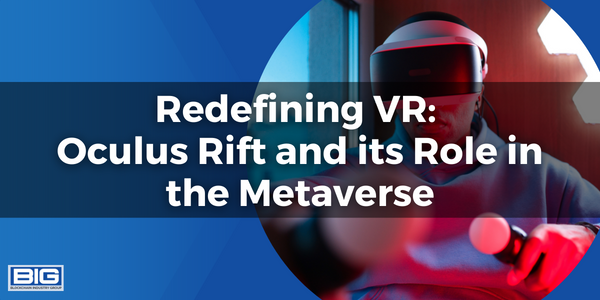
Virtual reality (VR) has long been hailed as the gateway to the metaverse, a digital realm where users can interact and explore immersive virtual worlds. Among the pioneers that revolutionized VR and paved the way for the metaverse, Oculus Rift stands out as a game-changer.
In this in-depth article, we will delve into how Oculus Rift redefined virtual reality, transformed industries, and played a crucial role in shaping the path to the metaverse. From its groundbreaking technology to its impact on various sectors, we will explore the key elements that have made Oculus Rift a driving force in the evolution of immersive experiences.
A Glimpse into Virtual Worlds: Introducing Oculus Rift
When Oculus Rift burst onto the scene in 2012 through a successful Kickstarter campaign, it introduced a new era of VR technology. The headset, developed by Oculus VR, offered an unprecedented level of immersion, with its high-resolution display, precise motion tracking, and immersive audio. By providing users with a sense of presence in virtual environments, Oculus Rift revolutionized the way we perceive and interact with digital content. It marked a significant milestone in the quest for the metaverse by offering a glimpse into the vast potential of virtual reality experiences.
Beyond Gaming: Oculus Rift’s Impact on Industries
While gaming has been a key focus for VR, Oculus Rift’s impact extends far beyond the realm of entertainment. The technology has made significant inroads into various industries, transforming the way we work, communicate, and experience the world. Here are some examples:
- Education and Training: Oculus Rift has found applications in education, enabling immersive and interactive learning experiences. From virtual field trips to simulated medical training, the technology has allowed students to explore new frontiers and gain hands-on experience in a safe and controlled environment.
- Design and Architecture: Architects and designers have leveraged Oculus Rift to visualize and walkthrough virtual models, allowing for more accurate assessments and enhanced client presentations. The ability to experience architectural spaces at scale and in three dimensions has revolutionized the design process.
- Healthcare and Therapy: VR experiences delivered through Oculus Rift have been utilized in healthcare for pain management, exposure therapy, and mental health treatments. The immersive nature of the technology has shown promising results in improving patient outcomes and providing alternative therapeutic interventions.
Fostering Virtual Communities: Social VR and Oculus Rift
The metaverse thrives on social interactions, and Oculus Rift has been instrumental in fostering virtual communities. Through its Social VR features and platforms like Facebook Horizon, Oculus Rift enables users to meet, interact, and engage with others in virtual environments. Whether it’s attending virtual events, playing games together, or simply socializing with friends from around the world, Oculus Rift has brought people closer in shared virtual spaces, forging new connections and expanding the horizons of social interaction.
Recent Developments with Oculus Rift
- Oculus Rift S is discontinued: On January 13, 2023, Meta announced that it would be discontinuing the Oculus Rift S. The company cited declining sales as the reason for the discontinuation.
- Oculus Quest 2 is the only remaining Oculus headset: With the discontinuation of the Oculus Rift S, the Oculus Quest 2 is now the only remaining Oculus headset. The Quest 2 is a standalone VR headset that does not require a PC to use. It is Meta’s most popular VR headset and is available for purchase for $299.
- Meta is focusing on the metaverse: Meta has shifted its focus to the metaverse, a hypothesized iteration of the internet as a single, universal and immersive virtual world that is facilitated by the use of virtual reality and augmented reality headsets. Meta is investing heavily in the metaverse and is working on a number of projects, including a new VR operating system and a new VR headset.
- The future of Oculus Rift is uncertain: The future of Oculus Rift is uncertain. Meta has not announced any plans to release a new Oculus Rift headset. It is possible that Meta will discontinue the Oculus Rift brand altogether and focus on the Oculus Quest 2. It is also possible that Meta will release a new Oculus Rift headset in the future. Only time will tell what the future holds for Oculus Rift.
Paving the Path to the Metaverse: Oculus Rift’s Role in the Future
Oculus Rift has pushed the boundaries of VR technology. The company’s commitment to innovation, combined with the growing ecosystem of VR content and experiences, sets the stage for the metaverse’s expansion. Oculus Rift’s role in pioneering immersive experiences and its influence on other VR platforms contributed to the ongoing development and realization of the metaverse as a digital frontier.
Second Life’s Enduring Legacy and its Impact on the Digital Frontier
—
Social Virtual Worlds: A New Era of Social Interaction
—
The Components of the Metaverse: Building Blocks of a Digital Universe
Oculus Rift’s impact on the VR landscape and its contributions to shaping the path to the metaverse cannot be understated. Through its groundbreaking technology, industry applications, and efforts in fostering virtual communities, Oculus Rift has redefined our perception of virtual reality and accelerated the journey towards a more immersive and connected digital future.
The ability of Oculus Rift to transport users into virtual worlds, its impact on industries such as education, design, and healthcare, and its role in fostering social interactions within virtual communities have all played a significant role in shaping the path to the metaverse.



